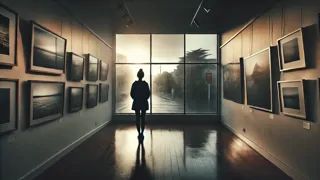Introduction
Maya paused at the edge of the Wellington waterfront, where the city’s lights blurred through the curtain of rain, and for a single, weightless moment, she felt completely alive in a way that had nothing to do with tomorrow or yesterday. Everything around her—the low hum of cars gliding down cobblestone streets, the silver haze that clung to the lamp posts, the distant calls of seagulls fighting the wind—slipped away to leave a pure, unguarded point of radiance inside her chest. The damp air smelled of salt and fresh earth, and a stray tear mingled with the raindrops on her cheek, as if the world itself wept in silent celebration. She lifted her face and let the cold droplets find their way across her closed eyelids, tasting the electric thrill of something close to perfection.
Maya tightened the scarf around her neck, its wool soft against her skin, and took a slow breath. In that pause, the ordinary city—its gray buildings, its old trams, its scattered umbrellas—felt transformed into a place of possibility. There was no ache in her heart, no restless tug of regret, just a pure connection to the present, as if she had discovered a secret language in the rhythm of thunder overhead and the distant swell of waves. She let herself smile, even though she was alone, and as she crossed the street, the world seemed to hold its breath in agreement.
Each footstep resonated with promise: the promise that life could surprise her at any moment, offering an unexpected gift of joy. And just as quickly, that gift slipped through her fingers when she reached the small wooden bench by the harbor. Reality returned subtly—the single streetlamp flickered, then steadied its glow; a solitary figure wrapped in a raincoat hurried past; the thunder faded into murmurs. Yet in her veins lingered the echo of that sudden lightness, a memory she knew she would chase even after the moment dissolved.
A Spark in the Storm
Maya’s heart fluttered as she sat on the wooden bench, droplets collecting at her collar and dripping onto the planks below. She closed her eyes, willing herself to return to that vivid instant of elation, when every breath had tasted like possibility. The rhythm of the rain felt like applause, the world encouraging her to savor what she had discovered in those stolen seconds. She reached into her pocket for her phone, but the screen lay dark—no messages, no calls—as if her life had paused, granting her solitude in its simplest form.

She recalled the last time she had felt something so purely joyous. It had been years earlier, among the jacaranda blossoms in her childhood home, and even then the feeling had been tinged with memory. Here, though, on the edge of Wellington Harbor, it was wholly new, unscripted by longing or regret. She could almost see it shimmering at the corner of her vision: a bright shape of freedom that beckoned if only she would lean closer.
A tram’s distant bell broke her reverie, and she rose, smoothing her raincoat. The city felt awake around her, each footstep a part of the unseen symphony that created Wellington’s unique pulse. A row of lights traced the waterfront path, and she followed them with deliberate care, determined to hold onto the echo of her heartbeat rather than letting it fade. Even the wind, which tugged at her hair, seemed less invasive in that fragile glow—more like a companion than a force to be reckoned with.
Every turn of the pathway reminded her that life moves forward whether you want it to or not. Still, she walked in place for an extra moment, tempted to lean into the air as though she could draw that fleeting euphoria back into herself. A distant music drifted from an open window—a slow ballad tinged with longing—and she smiled at how everything aligned: rain, city, song, hope. For a heartbeat, she belonged entirely to now.
Echoes of Hope
The next morning, the world was calm again. Beneath a sky scrubbed clean by last night’s downpour, Wellington’s hills looked almost idyllic, with sunlight filtering through drifting clouds. Maya walked along Charlotte Quarter with her hands tucked in her pockets, replaying the previous night’s moment in her mind. The gentle shimmer of raindrops on shop windows reminded her that joy can arrive on days that seem ordinary.

She found herself humming the melody from the tram-side musician’s guitar, though she wasn’t sure where she had heard it. She paused at a café under a striped awning, ordering a flat white and watching steam curl from the porcelain cup. It felt ritualistic, as though she needed to crown the morning with a simple pleasure to prove her delight was real. Inside the café, the polished wood and muted chatter felt comforting, the barista’s smile like an echo of last night’s brightness.
Coffee in hand, Maya navigated a series of errands, each task transformed by her lingering elation. A quick visit to the fruit stand took on the shape of a mini-adventure as she selected perfect peaches whose scent brought a fresh wave of contentment. At the library, she ran her fingers along spines of books she hadn’t touched since childhood, imagining entire worlds waiting to be rediscovered. For once, the weight of her to-do list felt like a promise rather than a burden.
Her phone buzzed in her bag—emails, traffic alerts, a reminder for a meeting she would attend later. But she slipped her hand inside and ignored it, letting the silence of the moment speak louder. While she walked past the harbor once more, the calm water held the sky’s reflection: fractured pieces of silver and blue. Each ripple reminded her that happiness, like water, can shift shape even when it seems still. She closed her eyes and let the breeze brush her cheeks, the city’s hush becoming a lullaby for hope.
Shadows of Disillusionment
By afternoon, the colors around her felt slightly off. The café’s walls looked paler, the fruit stand’s peaches less vivid. Maya felt the pull of ordinary concerns creeping back in—phone calls she’d put off, the humdrum of work awaiting her attention, an ache she thought she had shelved for good. The longer she held onto her blissful memory, the more unreachable it seemed, as if swallowed by the very city that had birthed it.

She ducked into a small gallery showcasing local photographers. Inside, images of wind-whipped cliffs and mist-laden rain forests lined the walls. She admired the way light and shadow danced across each frame, but her own reflection in the glass felt hollow. Where she had expected a glow, she found only a blurred silhouette, searching for something it could no longer grasp. A voice behind her murmured about the artist’s inspiration—how a moment of grace amid chaos can define an entire life. Maya listened, but the words felt like echoes of a promise that had already faded.
When she stepped back onto the street, the sky had turned steel gray again. The wind gusted around corners, carrying the distant rumble of afternoon traffic. She zipped up her coat, wishing she could fast-forward through the day until night offered another chance at renewal. But as she walked, tasmanian shadows pooled along the path, and the city hummed with its relentless pace, indifferent to her longing. Every smile she forced felt brittle, every breath a reminder of the gulf between memory and now.
At a crosswalk, she watched a family pass by, their laughter bright against the dim afternoon. She envied their simple togetherness, the steady comfort of shared routine. She realized then that her sparkle of happiness had been so fragile because it was unmoored—untethered to anyone or anything except her own sudden openness. And while that openness had felt like victory, it also left her vulnerable when the world resumed its turn.
Conclusion
Maya slipped back into her apartment as dusk fell, the city’s lamplight shimmering through the window like distant stars. She perched on the edge of her bed, fingertips tracing the edge of a photograph she’d snapped the night before: the lamppost glow dancing off the wet pavement. She studied the image and let herself remember how it felt to be weightless, if only for a breath. In the cool hush of her room, she understood that joy does not always arrive anchored in expectation; sometimes it flares up, beautiful and brief, then fades so you can learn to carry its memory forward.
Closing her eyes, she breathed in once more the echo of that moment, softer now but no less real. Tomorrow she would face her routine—emails, errands, appointments—as she always had. But she’d changed. She had felt brilliance in the ordinary. And though disillusionment’s shadow hovered, it could not erase the spark she had found. With a gentle exhale, Maya reached for her notebook to begin again, ready to sketch the outline of hope between the lines of her everyday life.
















